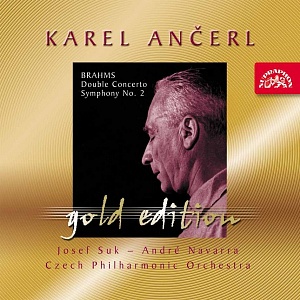Album

Czech Philharmonic Orchestra, Karel Ančerl
Ančerl Gold Edition 31. Brahms: Double Concerto, Symphony No. 2
Digital services
Catalogue Number: SU 3691-2
Published: 16th August 2004
Genre: Symphony
Format: 1 CD
This album has received following awards:
- Diapason d´Or, Diapason Magazine (2004)
This sixth batch of half-dozen titles coming out in the Ančerl Gold series is certain to bring a genuine delight to the great conductor's fans. In fact, the new instalment presents tour deforce accounts of music encompassing three highly distinctive genres. First, cantata masterworks by leading modern-time composers, with Stravinsky and Prokofiev representing the broader international context, and Martinů and Vycpálek epitomizing the Czech music scene. Indeed, the cantata genre was a terrain on which Ančerl happenned to feel truly at home: he knew how to cope with some of modern music's peculiar means of expression, and how to make them accessible to the audience; at the same time, he was simply great at work with the human voice and its integration into thelarge symphonic orchestral apparatus. For its part, the presentation of Stravinsky's Les Noces is quite inevitably a major event in its own right - for how often does one get the chance oflistening to the concerted sound, on one platform, along with vocal soloists, of no fewer than four pianos? The second cornerstone which holds together the present group of titles in the Ančerl series is defined by the impact of large-scale, serious symphonic works, ranging from Brahms' "Second" through Mahler's "Ninth", to the last two symphonic compositions of BohuslavMartinů - incidentally, works which Ančerl recorded at a time when the exiled Martinů was rather less than acceptable to his home country's political powers that be. Finally, the last categoryof works represented here are instrumental concertos. Ančerl was a very keen accompanist indeed, and an extremely diligent one as well, especially when working in tandem with such soloists as Josef Suk, or another famous "permanent feature" of the whole Ančerl series, the cellist André Navarra. Importantly, with Ančerl orchestral accompaniment is never relegated to the status of passive background; rather, it enhances and complements the soloist's performance, creatively completing the composition's overall picture on the planes of technique and style.
|
Johannes Brahms
Concerto for Violin, Cello and Orchestra in A minor, Op. 102
|
|||
| 1. | Allegro | 16:47 | |
| 2. | Andante | 07:14 | |
| 3. | Vivace non troppo | 08:51 | |
|
Johannes Brahms
Symphony No. 2 in D major, Op. 73
|
|||
| 4. | Allegro non troppo | 15:04 | |
| 5. | Adagio non troppo | 09:20 | |
| 6. | Allegretto grazioso (quasi andantino) | 05:21 | |
| 7. | Allegro con spirito | 09:01 | |